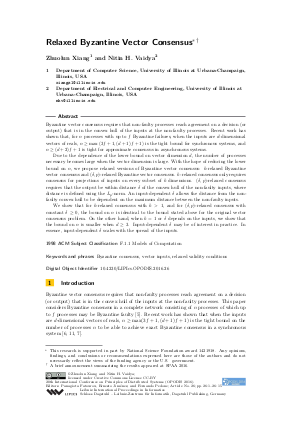Relaxed Byzantine Vector Consensus
Authors Zhuolun Xiang, Nitin H. Vaidya
-
Part of:
Volume:
20th International Conference on Principles of Distributed Systems (OPODIS 2016)
Part of: Series: Leibniz International Proceedings in Informatics (LIPIcs)
Part of: Conference: International Conference on Principles of Distributed Systems (OPODIS) - License:
 Creative Commons Attribution 3.0 Unported license
Creative Commons Attribution 3.0 Unported license
- Publication Date: 2017-04-06
File

PDF
LIPIcs.OPODIS.2016.26.pdf
- Filesize: 0.6 MB
- 15 pages
Document Identifiers
Subject Classification
Keywords
- Byzantine consensus
- vector inputs
- relaxed validity conditions
Metrics
- Access Statistics
-
Total Accesses (updated on a weekly basis)
0PDF Downloads0Metadata Views
Abstract
Byzantine vector consensus requires that non-faulty processes reach agreement on adecision (or output) that is in the convex hull of the inputs at the non-faulty processes. Recent work has shown that, for n processes with up to f Byzantine failures, when the inputs are d-dimensional vectors of reals, n >= max (3f + 1, (d + 1)f + 1) is the tight bound for synchronous systems, and n >= (d + 2)f + 1 is tight for approximate consensus in asynchronous systems.
Due to the dependence of the lower bound on vector dimension d, the number of processes necessary becomes large when the vector dimension is large. With the hope of reducing the lower bound on n, we propose relaxed versions of Byzantine vector consensus: k-relaxed Byzantine vector consensus and (delta, p)-relaxed Byzantine vector consensus. k-relaxed consensus only requires consensus for projections of inputs on every subset of k dimensions. (delta, p)-relaxed consensus requires that the output be within distance d of the convex hull of the non-faulty inputs, where distance is defined using the L_{p}-norm. An input-dependent delta allows the distance from the non-faulty convex hull to be dependent on the maximum distance between the non-faulty inputs.
We show that for k-relaxed consensus with k > 1, and for (delta, p)-relaxed consensus with constant delta >= 0, the bound on n is identical to the bound stated above for the original vector consensus problem. On the other hand, when k = 1 or d depends on the inputs, we show that the bound on n is smaller when d >= 3. Input-dependent delta may be of interest in practice. In essence, input-dependent delta scales with the spread of the inputs.
Cite As Get BibTex
Zhuolun Xiang and Nitin H. Vaidya. Relaxed Byzantine Vector Consensus. In 20th International Conference on Principles of Distributed Systems (OPODIS 2016). Leibniz International Proceedings in Informatics (LIPIcs), Volume 70, pp. 26:1-26:15, Schloss Dagstuhl – Leibniz-Zentrum für Informatik (2017)
https://doi.org/10.4230/LIPIcs.OPODIS.2016.26
BibTex
@InProceedings{xiang_et_al:LIPIcs.OPODIS.2016.26,
author = {Xiang, Zhuolun and Vaidya, Nitin H.},
title = {{Relaxed Byzantine Vector Consensus}},
booktitle = {20th International Conference on Principles of Distributed Systems (OPODIS 2016)},
pages = {26:1--26:15},
series = {Leibniz International Proceedings in Informatics (LIPIcs)},
ISBN = {978-3-95977-031-6},
ISSN = {1868-8969},
year = {2017},
volume = {70},
editor = {Fatourou, Panagiota and Jim\'{e}nez, Ernesto and Pedone, Fernando},
publisher = {Schloss Dagstuhl -- Leibniz-Zentrum f{\"u}r Informatik},
address = {Dagstuhl, Germany},
URL = {https://drops.dagstuhl.de/entities/document/10.4230/LIPIcs.OPODIS.2016.26},
URN = {urn:nbn:de:0030-drops-70958},
doi = {10.4230/LIPIcs.OPODIS.2016.26},
annote = {Keywords: Byzantine consensus, vector inputs, relaxed validity conditions}
}
Author Details
References
-
Brian A. Coan and Jennifer L. Welch. Modular construction of a byzantine agreement protocol with optimal message bit complexity. Information and Computation, 97(1):61-85, 1992.

-
Michael J. Fischer, Nancy A. Lynch, and Michael Merritt. Easy impossibility proofs for distributed consensus problems. Springer, 1990.

-
Maurice Herlihy, Sergio Rajsbaum, Michel Raynal, and Julien Stainer. Computing in the presence of concurrent solo executions. In LATIN 2014: Theoretical Informatics, pages 214-225. Springer, 2014.

-
Gottfried Köthe. Topological vector spaces. Springer, 1983.

-
Leslie Lamport, Robert Shostak, and Marshall Pease. The byzantine generals problem. ACM Transactions on Programming Languages and Systems (TOPLAS), 4(3):382-401, 1982.

-
Hammurabi Mendes and Maurice Herlihy. Multidimensional approximate agreement in byzantine asynchronous systems. In Proceedings of the 45th Annual ACM Symposium on Theory of Computing, pages 391-400. ACM, 2013.

-
Hammurabi Mendes, Maurice Herlihy, Nitin H. Vaidya, and Vijay K. Garg. Multidimensional agreement in byzantine systems. Distributed Computing, 28(6):423-441, 2015.

-
Lewis Tseng and Nitin H. Vaidya. Byzantine convex consensus: An optimal algorithm. arXiv preprint arXiv:1307.1332, 2013.

-
Lewis Tseng and Nitin H. Vaidya. Asynchronous convex hull consensus in the presence of crash faults. In Proceedings of the 2014 ACM Symposium on Principles of Distributed Computing, pages 396-405. ACM, 2014.

-
Nitin H. Vaidya. Iterative byzantine vector consensus in incomplete graphs. In Distributed Computing and Networking, pages 14-28. Springer, 2014.

-
Nitin H. Vaidya and Vijay K. Garg. Byzantine vector consensus in complete graphs. In Proceedings of the 2013 ACM Symposium on Principles of Distributed Computing, pages 65-73. ACM, 2013.

-
Zhuolun Xiang and Nitin H Vaidya. Relaxed byzantine vector consensus. arXiv preprint arXiv:1601.08067, 2016.

